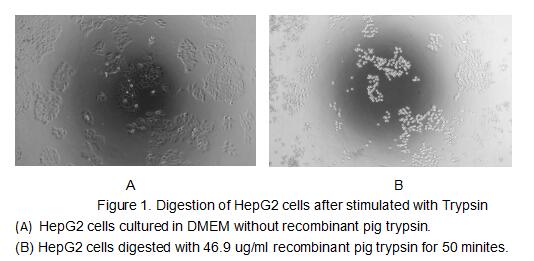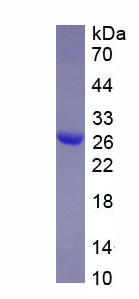Active Trypsin (TRY) 

- UOM
- FOB US$ 280.00 US$ 700.00 US$ 1,400.00 US$ 4,200.00 US$ 10,500.00
- Quantity
Overview
Properties
- Product No.APA250Po51
- Organism SpeciesSus scrofa; Porcine (Pig) Same name, Different species.
- ApplicationsCell culture; Activity Assays.
Research use only - DownloadInstruction Manual
- CategoryHuman gene deletion
- Buffer FormulationPBS, pH7.4, containing 5% Trehalose.
- Traits Freeze-dried powder, Purity > 95%
- Isoelectric Point7.0
Sign into your account
Share a new citation as an author
Upload your experimental result
Review

Contact us
Please fill in the blank.
Activity test

Trypsin is a serine protease from the PA clan superfamily, found in the digestive system of many vertebrates, where it hydrolyzes proteins. Trypsin cuts peptide chains mainly at the carboxyl side of the amino acids lysine or arginine. It is used for numerous biotechnological processes. The connection between animal cells is a specific connection formed by the differentiation of the plasma membrane (cell membrane) between adjacent cells. The plasma membrane is mostly composed of protein-lipid-protein unit membrane, and the proteins on the plasma membrane are mostly involved in the connection. Thus, the digestion of adherent cells HepG2 was to detect the bioactivity of recombint pig trypsin. HepG2 cells were seeded into 96-well plates at a density of 4,000 cells/well with 10% serum standard DMEM overnight. Various concentrations of recombinant pig trypsin was added into the HepG2 after washed by PBS buffer. Cells were observed by inverted microscope after a period of time cultured at 37℃. The result was shown in Figure 1. It was obvious that recombinant pig trypsin can digest the HepG2, the minimum protein concentration was 46.9 ug/ml.
Usage
Reconstitute in 10mM PBS (pH7.4) to a concentration of 0.1-1.0 mg/mL. Do not vortex.
Storage
Avoid repeated freeze/thaw cycles. Store at 2-8°C for one month. Aliquot and store at -80°C for 12 months.
Stability
The thermal stability is described by the loss rate. The loss rate was determined by accelerated thermal degradation test, that is, incubate the protein at 37°C for 48h, and no obvious degradation and precipitation were observed. The loss rate is less than 5% within the expiration date under appropriate storage condition.
Increment services
-
 BCA Protein Quantification Kit
BCA Protein Quantification Kit
-
 Molecular Mass Marker for Protein
Molecular Mass Marker for Protein
-
 Monoclonal Antibody Customized Service
Monoclonal Antibody Customized Service
-
 Polyclonal Antibody Customized Service
Polyclonal Antibody Customized Service
-
 Protein Activity Test Experiment Service
Protein Activity Test Experiment Service
-
 Electrophoretic Mobility Shift Assay (EMSA) Experiment Service
Electrophoretic Mobility Shift Assay (EMSA) Experiment Service
-
 Buffer
Buffer
-
 Lentivirus Packaging Experiment Service
Lentivirus Packaging Experiment Service
-
 Adenovirus Packaging Experiment Service
Adenovirus Packaging Experiment Service
-
 Real Time PCR Experimental Service
Real Time PCR Experimental Service
-
 Spike RBD Protein (S-RBD)
Spike RBD Protein (S-RBD)
-
 Protein G
Protein G
-
 Protein A
Protein A







